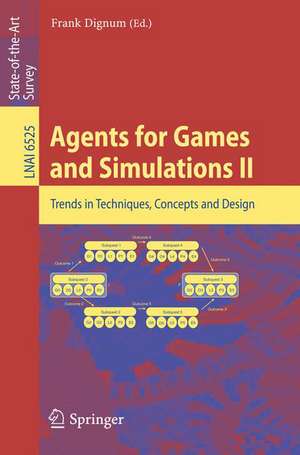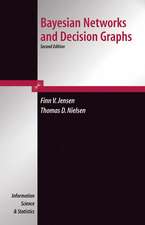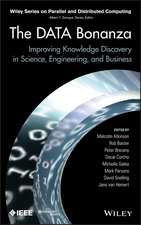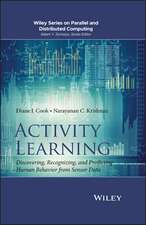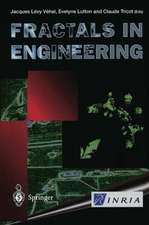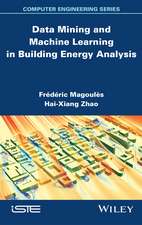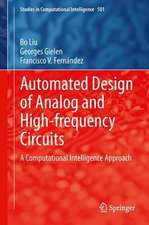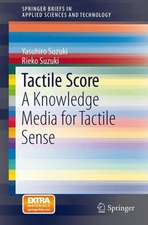Agents for Games and Simulations II: Trends in Techniques, Concepts and Design: Lecture Notes in Computer Science, cartea 6525
Editat de Frank Dignumen Limba Engleză Paperback – 14 ian 2011
This state-of-the-art survey contains a collection of papers presented at AGS 2010; the Second International Workshop on Agents for Games and Simulations, held on May 10, 2010, in Toronto, as well as extended versions of papers from other workshops and from the AAMAS conference. The 14 papers are organized in three topical sections focusing on architectures combining agents and game engines, on the training aspects of the games, on social and organizational aspects of games and agents, respectively.
Din seria Lecture Notes in Computer Science
- 20%
 Preț: 1061.55 lei
Preț: 1061.55 lei - 20%
 Preț: 307.71 lei
Preț: 307.71 lei - 20%
 Preț: 438.69 lei
Preț: 438.69 lei - 20%
 Preț: 579.30 lei
Preț: 579.30 lei -
 Preț: 410.88 lei
Preț: 410.88 lei - 17%
 Preț: 427.22 lei
Preț: 427.22 lei - 20%
 Preț: 596.46 lei
Preț: 596.46 lei - 15%
 Preț: 448.04 lei
Preț: 448.04 lei - 20%
 Preț: 353.50 lei
Preț: 353.50 lei -
 Preț: 389.49 lei
Preț: 389.49 lei - 20%
 Preț: 309.90 lei
Preț: 309.90 lei - 20%
 Preț: 645.28 lei
Preț: 645.28 lei - 20%
 Preț: 763.23 lei
Preț: 763.23 lei - 15%
 Preț: 580.46 lei
Preț: 580.46 lei - 20%
 Preț: 310.28 lei
Preț: 310.28 lei - 20%
 Preț: 655.02 lei
Preț: 655.02 lei - 20%
 Preț: 1183.14 lei
Preț: 1183.14 lei - 20%
 Preț: 340.32 lei
Preț: 340.32 lei -
 Preț: 449.57 lei
Preț: 449.57 lei - 20%
 Preț: 591.51 lei
Preț: 591.51 lei - 18%
 Preț: 938.83 lei
Preț: 938.83 lei - 20%
 Preț: 337.00 lei
Preț: 337.00 lei - 20%
 Preț: 649.50 lei
Preț: 649.50 lei - 20%
 Preț: 607.40 lei
Preț: 607.40 lei - 20%
 Preț: 1414.79 lei
Preț: 1414.79 lei - 20%
 Preț: 1024.44 lei
Preț: 1024.44 lei - 20%
 Preț: 583.40 lei
Preț: 583.40 lei - 20%
 Preț: 453.32 lei
Preț: 453.32 lei - 20%
 Preț: 575.49 lei
Preț: 575.49 lei - 20%
 Preț: 1075.26 lei
Preț: 1075.26 lei - 20%
 Preț: 585.88 lei
Preț: 585.88 lei - 20%
 Preț: 825.93 lei
Preț: 825.93 lei - 17%
 Preț: 360.20 lei
Preț: 360.20 lei - 20%
 Preț: 763.23 lei
Preț: 763.23 lei - 20%
 Preț: 340.32 lei
Preț: 340.32 lei - 20%
 Preț: 504.58 lei
Preț: 504.58 lei - 20%
 Preț: 369.13 lei
Preț: 369.13 lei - 20%
 Preț: 580.93 lei
Preț: 580.93 lei - 20%
 Preț: 343.62 lei
Preț: 343.62 lei - 20%
 Preț: 350.21 lei
Preț: 350.21 lei - 20%
 Preț: 583.40 lei
Preț: 583.40 lei - 20%
 Preț: 583.40 lei
Preț: 583.40 lei - 15%
 Preț: 438.59 lei
Preț: 438.59 lei - 20%
 Preț: 341.95 lei
Preț: 341.95 lei - 20%
 Preț: 238.01 lei
Preț: 238.01 lei - 20%
 Preț: 538.30 lei
Preț: 538.30 lei
Preț: 301.12 lei
Preț vechi: 376.39 lei
-20% Nou
Puncte Express: 452
Preț estimativ în valută:
57.63€ • 62.57$ • 48.41£
57.63€ • 62.57$ • 48.41£
Carte tipărită la comandă
Livrare economică 22 aprilie-06 mai
Preluare comenzi: 021 569.72.76
Specificații
ISBN-13: 9783642181801
ISBN-10: 3642181805
Pagini: 217
Ilustrații: X, 206 p.
Dimensiuni: 155 x 235 x 18 mm
Greutate: 0.34 kg
Ediția:2011
Editura: Springer Berlin, Heidelberg
Colecția Springer
Seriile Lecture Notes in Computer Science, Lecture Notes in Artificial Intelligence
Locul publicării:Berlin, Heidelberg, Germany
ISBN-10: 3642181805
Pagini: 217
Ilustrații: X, 206 p.
Dimensiuni: 155 x 235 x 18 mm
Greutate: 0.34 kg
Ediția:2011
Editura: Springer Berlin, Heidelberg
Colecția Springer
Seriile Lecture Notes in Computer Science, Lecture Notes in Artificial Intelligence
Locul publicării:Berlin, Heidelberg, Germany
Public țintă
ResearchCuprins
Architectures:
Unreal Goal Bots: Conceptual Design of a Reusable Interface,- A Periphery of Pogamut: From Bots to Agents and Back Again,- Goal-Based Communication Using BDI Agents as Virtual Humans in Training: An Ontology Driven Dialogue System,- Evaluation and Comparison of Multi-agent Based Crowd Simulation Systems,- Towards an Architecture for Collaborative Human/AI Control of Interactive Characters Training and Story Lines: An Architecture for Directing Value-Driven Artificial Characters,- Implicitly and Intelligently Influencing the Interactive Experience,- Creating Customized Game Experiences by Leveraging Human Creative Effort: A Planning Approach,- Guiding User Adaptation in Serious Games,- Using Agent Technology to Build a Real-World Training Application,- Social Behavior and Organization: Semi-Automated Dialogue Act Classification for Situated Social Agents in GamesUsing Exclusion Logic to Model Social Practices,-Making Games ALIVE: An Organisational Approach,- Building Quests for Online Games with Virtual Institutions
Unreal Goal Bots: Conceptual Design of a Reusable Interface,- A Periphery of Pogamut: From Bots to Agents and Back Again,- Goal-Based Communication Using BDI Agents as Virtual Humans in Training: An Ontology Driven Dialogue System,- Evaluation and Comparison of Multi-agent Based Crowd Simulation Systems,- Towards an Architecture for Collaborative Human/AI Control of Interactive Characters Training and Story Lines: An Architecture for Directing Value-Driven Artificial Characters,- Implicitly and Intelligently Influencing the Interactive Experience,- Creating Customized Game Experiences by Leveraging Human Creative Effort: A Planning Approach,- Guiding User Adaptation in Serious Games,- Using Agent Technology to Build a Real-World Training Application,- Social Behavior and Organization: Semi-Automated Dialogue Act Classification for Situated Social Agents in GamesUsing Exclusion Logic to Model Social Practices,-Making Games ALIVE: An Organisational Approach,- Building Quests for Online Games with Virtual Institutions
Textul de pe ultima copertă
While today's game engines and multi-agent platforms cross-fertilize each other to some extent, the technologies used in these areas are not readily compatible due to some differences in their primary concerns. Where game engines prioritize efficiency and central control, multi-agent platforms focus on agent autonomy and sophisticated communication capabilities. This volume gives an overview of the current state of the art for people wishing to combine agent technology with (serious) games.
This state-of-the-art survey contains a collection of papers presented at AGS 2010; the Second International Workshop on Agents for Games and Simulations, held on May 10, 2010, in Toronto, as well as extended versions of papers from other workshops and from the AAMAS conference. The 14 papers are organized in three topical sections focusing on architectures combining agents and game engines, on the training aspects of the games, on social and organizational aspects of games and agents, respectively.
This state-of-the-art survey contains a collection of papers presented at AGS 2010; the Second International Workshop on Agents for Games and Simulations, held on May 10, 2010, in Toronto, as well as extended versions of papers from other workshops and from the AAMAS conference. The 14 papers are organized in three topical sections focusing on architectures combining agents and game engines, on the training aspects of the games, on social and organizational aspects of games and agents, respectively.
Caracteristici
State of the art results in research on agents for games and simulations Forms an overview for anyone who wants to combine agent technology with (serious) games The papers focus on architectures combining agents and game engines; training aspects of the games; as well as on social and organizational aspects of games and agents.
